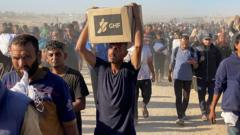Witnesses and international medical teams have reported horrific scenes of violence as Israeli troops opened fire on Palestinians eagerly flocking to a new aid distribution hub in southern Gaza early Tuesday. One foreign observer described the chaotic situation as "total carnage."
In contrast, an official Israeli military statement portrayed a different narrative, insisting that "several suspects" deviated from designated access routes towards Israeli forces, prompting troops to give warning fire and shoot near individuals approaching them.
The emergence of civilian killings while people sought urgently needed food aid will likely intensify scrutiny on the controversial new aid distribution system in Gaza. This system, initiated by Israel with U.S. support, replaces the previously established operations run by UN agencies and experienced international aid organizations, drawing increased skepticism from human rights advocates.
The Gaza Humanitarian Foundation (GHF), a new private entity employing armed security teams from an American company, took over distribution after a complete Israeli blockade led to a significant risk of famine among the Gazan population. Israel has accused UN personnel of allowing Hamas to misappropriate much of the aid, although the UN denies these allegations and refuses to collaborate with the GHF.
Despite the GHF's intention to provide aid, it has revealed critical flaws, as highlighted by the recent resignation of its head, Jake Wood, who criticized its inability to adhere to essential humanitarian principles like neutrality and independence. Under the GHF's system, individuals must navigate through war-torn areas to obtain food supplies, resulting in disorganised and often chaotic distributions, where the most vulnerable are left empty-handed.
UN High Commissioner for Human Rights, Volker Türk, expressed concerns regarding the GHF plan, describing it as demonstrating a "complete disregard for civilians." He highlighted the desperation faced by those deprived of food and medical care, underscoring the necessity for better protocols to protect non-combatants during such crises.
Critics argue that the GHF framework serves not only as an inadequate response to humanitarian needs but also as a tool for Israeli control over Palestinians, especially given statements from Israeli officials who see food aid as leverage against Hamas.
The turmoil surrounding the GHF's operations coincides with mounting pressure from Israel’s allies—such as the UK, France, and Canada—demanding significant changes in Israel's humanitarian approach in Gaza, including the allowance of necessary aid for over two million Gazans. Consequences, potentially including sanctions and recognition of Palestine as a state, are looming on the horizon if Israel fails to respond positively to international calls for reform, further isolating it on the global stage.


















